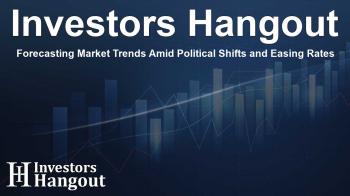Forecasting Market Trends Amid Political Shifts and Easing Rates

Understanding Market Trends Ahead of Major Changes
As political landscapes shift, savvy U.S. investors are gearing up for transformative changes that could define the economic environment for the years to come. With anticipated adjustments in tariffs, deregulation, and tax policies, the stage is set for President-elect Donald Trump's return to office, compelling investors to reconsider their strategies. This new administration sparks the question: Can the U.S. economy maintain its growth momentum amidst these changes?
The Impact of Political Transition on Investments
The impending political transitions are expected to have significant repercussions on various asset classes, including stocks, bonds, and currencies, necessitating a realignment of investment portfolios. Many analysts predict that even amidst a political shift, U.S. economic exceptionalism will endure, fueled by strong consumer spending and a resilient labor market. This sets a solid foundation compared to several developed markets worldwide.
Anticipating Robust Economic Performance
Forecasts suggest that sectors within the U.S. economy will continue to thrive, particularly if tax reforms make headway through Congress. Analysts believe corporate tax reductions could bolster earnings, leading to heightened investor sentiment and stock performance. In contrast, the euro-zone's recent economic growth may face hurdles due to emerging tariffs and ongoing trade challenges, especially with China. These external pressures could hinder the euro-zone's potential, placing the U.S. in a more advantageous position.
The Federal Reserve's Influence on Market Dynamics
In the wake of possible shifts in administration, investors are closely monitoring the U.S. Federal Reserve's actions regarding interest rates. Following substantial hikes, the Fed recently paused its rate changes, hinting at a more conservative approach moving forward. This caution may influence stock market performance as expectations of softer monetary policies could collide with rising Treasury yields, creating a delicate balance for investors.
What to Expect from the Dollar
Despite challenges over the year, many Forex strategists anticipate a continued rally for the U.S. dollar. Factors propelling this strength include ongoing economic growth, rising Treasury yields, and Trump’s anticipated tariffs, which could create a more favorable environment for the greenback. Consequently, a strong dollar might adversely affect U.S. multinationals by complicating their ability to compete internationally, while simultaneously easing inflation for other central banks adopting more aggressive monetary policies.
Navigating Potential Volatility in the Market
Market stability can quickly turn volatile, and recent observations have illustrated how swiftly conditions can change. Following the Fed's outlook on reduced rate cuts, stocks experienced sharp declines, revealing the underlying fragility of investor confidence. While analysts anticipate a generally stable trading atmosphere, they caution the market is overdue for a shakeup, particularly in the foreign exchange sector, where tariffs and central bank decisions could lead to heightened fluctuations.
Emerging Cryptocurrency Trends
The enthusiasm surrounding cryptocurrencies, particularly Bitcoin, shows no signs of waning as we look ahead. The past year has been marked by unprecedented speculation, with Bitcoin reaching an impressive milestone of over $100,000, igniting a renewed interest in crypto assets. Leaders within the cryptocurrency space, including significant players like MicroStrategy, have experienced remarkable gains, indicative of a broader trend where investors are eager to capitalize on evolving market dynamics.
Conclusion: Preparing for an Uncertain Economic Future
As the political narrative in the U.S. continues to evolve, implications for the financial landscape are manifold. Investors must remain vigilant, adjusting their strategies in anticipation of potential policy shifts and economic indicators. Whether it's re-evaluating stock positions, considering the implications of a strong dollar, or exploring cryptocurrency investments, the time for proactive planning is now.
Frequently Asked Questions
What are some expected changes in economic policy?
Anticipated changes include tariffs, deregulation, and potential tax reforms which may affect various market sectors.
How will the Federal Reserve influence the stock market?
The Fed’s decisions on interest rates will be crucial, especially if they opt for deeper or more rapid cuts, impacting investor sentiment.
What should investors consider regarding the U.S. dollar?
A strong dollar may affect U.S. multinationals adversely while easing inflation pressures in other economies.
What trends are emerging in the cryptocurrency market?
The cryptocurrency market, especially Bitcoin, has seen significant speculation which is expected to continue into the next year.
How can investors prepare for potential market volatility?
Investors are advised to stay informed and prepared to adjust their portfolios in response to market shifts and economic signals.
About Investors Hangout
Investors Hangout is a leading online stock forum for financial discussion and learning, offering a wide range of free tools and resources. It draws in traders of all levels, who exchange market knowledge, investigate trading tactics, and keep an eye on industry developments in real time. Featuring financial articles, stock message boards, quotes, charts, company profiles, and live news updates. Through cooperative learning and a wealth of informational resources, it helps users from novices creating their first portfolios to experts honing their techniques. Join Investors Hangout today: https://investorshangout.com/
Disclaimer: The content of this article is solely for general informational purposes only; it does not represent legal, financial, or investment advice. Investors Hangout does not offer financial advice; the author is not a licensed financial advisor. Consult a qualified advisor before making any financial or investment decisions based on this article. The author's interpretation of publicly available data shapes the opinions presented here; as a result, they should not be taken as advice to purchase, sell, or hold any securities mentioned or any other investments. The author does not guarantee the accuracy, completeness, or timeliness of any material, providing it "as is." Information and market conditions may change; past performance is not indicative of future outcomes. If any of the material offered here is inaccurate, please contact us for corrections.
